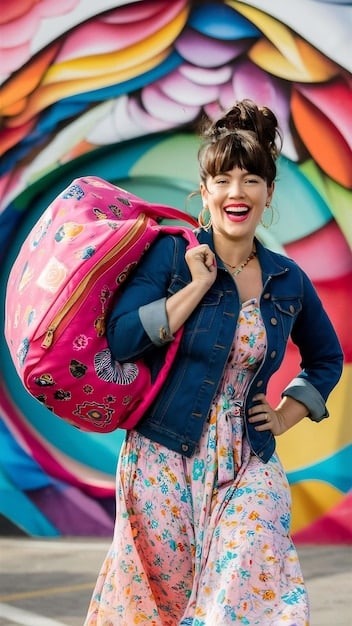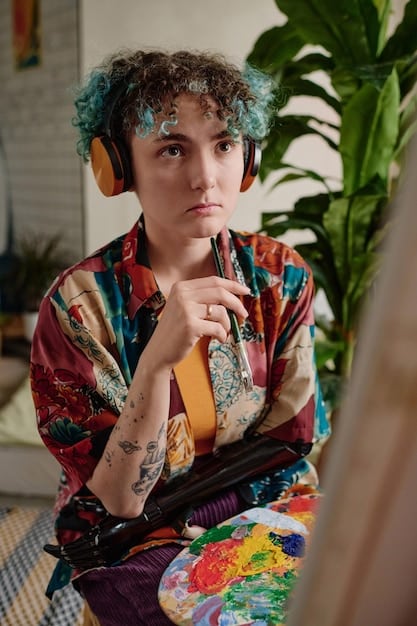Gen Z’s Influence on Pop Culture: Music, Movies, Fashion Trends in US

Gen Z’s impact on pop culture in the US is undeniable, reshaping music genres, influencing film narratives towards authentic representation, and driving fashion trends that prioritize sustainability and personal expression, marking a significant shift in mainstream tastes and industry practices.
The cultural landscape of the United States is in constant flux, but perhaps no generation has wielded as much transformative power as Gen Z. From the melodies dominating streaming playlists to the narratives unfolding on screen and the styles gracing runways and streets, Gen Z’s influence on pop culture: what’s trending in music, movies, and fashion in the US? is a question that reveals a dynamic shift in societal values and commercial strategies. This cohort, born roughly between 1997 and 2012, is not just consuming culture; they are actively shaping it with their unique perspectives on authenticity, inclusivity, and digital-native engagement.
The Digital-Native Sound: Gen Z’s Impact on Music
Gen Z’s relationship with music is inherently digital, primarily shaped by streaming platforms, social media, and short-form video apps. This has fundamentally altered how music is discovered, consumed, and even created. The era of passive listening is over; Gen Z actively participates in the journey of a song, from viral TikTok sounds to deep-dive album analyses on YouTube.
Their preferences are broad and eclectic, often blurring genre lines. Yet, there are clear trends that emerge, reflecting their values and digital upbringing. Authenticity reigns supreme, with artists who share raw, relatable experiences often garnering devoted followings. The polished pop star archetype still exists, but it coexists with a strong appreciation for indie artists, bedroom pop, and genre-bending collaborations.
TikTok as the Music Tastemaker
It’s impossible to discuss Gen Z’s musical tastes without acknowledging TikTok’s pervasive influence. Songs, sometimes years old, find new life as viral sounds, leading to chart resurgences and introducing artists to millions. This platform has democratized music discovery, allowing for unexpected hits and fostering a sense of community around shared audio trends.
- Viral Resurgence: Old songs gain new popularity through TikTok challenges.
- Democratized Discovery: Lesser-known artists can achieve mainstream success.
- Niche Communities: Subgenres and micro-trends thrive within specialized communities.
Beyond TikTok, artists are engaging with fans directly on platforms like Instagram and Discord, fostering a sense of intimacy and co-creation that previous generations rarely experienced. This direct line of communication builds loyalty and allows for more immediate feedback, influencing subsequent releases and artistic direction.
In the US, this has led to a fascinating blend of global sounds with local flair. K-Pop and Afrobeats, for example, have found massive traction among Gen Z, showcasing their open-mindedness and willingness to embrace diverse musical expressions. This global perspective enriches the American music scene, pushing boundaries and inspiring new fusions.
Cinematic Shifts: How Gen Z is Redefining Movies
For Gen Z, movies are more than just entertainment; they are a medium for reflection, representation, and social commentary. This generation approaches cinema with a critical eye, prioritizing stories that resonate with their lived experiences and address contemporary issues. While blockbusters still hold appeal, there’s a growing demand for nuanced narratives and diverse voices both in front of and behind the camera.
Streaming services are Gen Z’s primary gateway to films, offering an unparalleled library of choices and on-demand access. This has cultivated a taste for binge-watching series and exploring a wider range of international and independent films that might not receive mainstream theatrical releases. The traditional movie-going experience, while still cherished for certain events, has evolved to compete with the convenience and breadth of at-home viewing.
Authenticity and Social Conscience in Storytelling
Gen Z gravitates towards films that genuinely reflect the complexity of modern life and challenge conventional portrayals. Superficial plots and one-dimensional characters are often met with disinterest. Instead, they seek out films that tackle themes of mental health, LGBTQ+ rights, racial justice, and environmental concerns with sensitivity and depth.
- Diverse Representation: Demand for authentic characters across identities.
- Social Reckoning: Films that address complex societal issues are favored.
- Mental Health Focus: Narratives exploring mental wellness gain significant viewership.
The “cinematic universe” model, while still popular, is increasingly scrutinized. Gen Z appreciates interconnected stories but values quality over quantity, often preferring standalone films with strong narratives over endless franchise extensions that feel creatively diluted. Documentaries and docu-series, particularly those exposing societal injustices or celebrating untold histories, also find a strong audience within this demographic.
This generation’s influence is pushing studios and independent filmmakers alike to diversify their storytelling. Filmmakers who can effectively tap into these values — by crafting compelling, socially aware narratives with authentic character portrayals — are finding greater success in captivating this powerful demographic.
Fashion Forward: Gen Z’s Revolution in Style
Fashion for Gen Z is a powerful tool for self-expression, identity, and a statement of values. Unlike previous generations that might have adhered to specific tribal aesthetics, Gen Z embraces a fluid, personalized approach to style. They mix and match genres, prioritize comfort, and are deeply conscious of the ethical and environmental implications of their clothing choices.
Social media, particularly platforms like Instagram, Pinterest, and TikTok, serves as their primary fashion playground. Trends emerge and dissipate at lightning speed, often originating from micro-influencers or specific online communities rather than traditional high fashion runways. This decentralized trend pipeline allows for a greater diversity of styles and a more inclusive approach to what is considered “fashionable.”
Sustainability and Secondhand Dominance

One of the most defining characteristics of Gen Z’s fashion philosophy is their strong emphasis on sustainability. Fast fashion, while still accessible, is increasingly viewed with skepticism due to its environmental and ethical footprint. This has fueled a massive surge in the popularity of secondhand clothing, vintage finds, and upcycled garments.
- Thrift Store Culture: Resale apps and physical thrift stores are booming.
- Sustainable Brands: Support for brands with ethical production practices.
- Upcycling & DIY: Personalizing clothes to extend their lifespan and unique expression.
Depop, Poshmark, and ThredUp are not just marketplaces; they are integral parts of Gen Z’s fashion ecosystem, allowing them to curate unique wardrobes while minimizing their environmental impact. This movement is not just about affordability; it’s a conscious choice to reject consumerism and embrace a more circular economy.
Comfort and functionality are equally paramount. The rise of athleisure, oversized silhouettes, and gender-neutral clothing reflects a desire for practicality without sacrificing style. Brands that offer versatile pieces that can transition from casual outings to more dressed-up occasions are particularly appealing. This emphasis on comfort also intertwines with their focus on mental well-being, as clothing that feels good can contribute to a positive self-image.
Social Impact and Activism: Driving Cultural Narratives
What differentiates Gen Z’s engagement with pop culture is its inherent connection to social impact and activism. This generation doesn’t just consume art; they expect it to reflect and often champion their values. Artists, filmmakers, and fashion brands are increasingly held accountable for their social stances and their contributions to broader societal conversations.
This can manifest in various ways: a musician using their platform to advocate for climate action, a movie exploring themes of systemic injustice, or a fashion brand promoting body positivity and inclusivity. For Gen Z, the line between entertainment and advocacy is often blurred, with pop culture serving as a powerful vehicle for awareness and change.
Brand Authenticity and Values Alignment
Gen Z is highly attuned to corporate social responsibility. They are more likely to support brands (in any industry) that align with their ethical principles, whether that’s fair labor practices, environmental conservation, or diversity in leadership. Conversely, brands perceived as performative or disingenuous in their social messaging are quickly called out and often lose trust.
- Ethical Consumption: Prioritizing brands with transparent, ethical practices.
- Advocacy Marketing: Brands taking stances on social and political issues.
- Community Engagement: Valuing brands that actively involve and listen to their audience.
This scrutiny extends to the personal beliefs of public figures within pop culture. Artists and influencers are expected to be transparent and accountable, and their actions outside their creative work can significantly impact their standing with Gen Z audiences. This creates a cultural landscape where integrity and values are as important as talent and creativity.
The rise of digital activism also plays a crucial role. Social media enables rapid mobilization around causes, and pop culture figures often amplify these messages. From viral challenges supporting charitable causes to educational content dissecting complex social issues, Gen Z leverages popular platforms to drive meaningful dialogue and inspire collective action.
The Rise of Niche Communities and Fandoms
While mainstream trends still exist, Gen Z thrives within niche communities and intensely dedicated fandoms. The internet has allowed individuals with shared interests, no matter how specific, to connect, collaborate, and amplify their collective passion. This decentralization of culture means that influence is often spread across a multitude of smaller, interconnected groups rather than emanating from a single dominant source.
These communities form around specific artists, film franchises, fashion aesthetics, or even obscure internet lore. They are highly participatory, with members often creating their own content—fan fiction, fan art, TikTok edits, discussion forums—thereby becoming co-creators of the culture they consume. This active engagement creates a sense of belonging and validates individual tastes.
Customization and Personalization as a Norm

The ability to customize and personalize their experience is paramount for Gen Z. This extends beyond their personal style to how they consume media. Streaming platforms with 추천 algorithms, personalized playlists, and curated content feeds are the norm. They expect cultural offerings to cater to their individual preferences rather than a one-size-fits-all approach.
- Algorithmic Curation: Reliance on personalized content recommendations.
- Subculture Flourishing: Niche interests find large, dedicated audiences online.
- Creator Economy Integration: Direct support for independent artists and creators.
Within fashion, this translates into a demand for unique pieces that allow for individual expression. Thrift flips, small independent designers, and brands offering customizable options are highly valued. The desire to stand out, rather than to blend in, is a driving force, leading to a vibrant and constantly evolving aesthetic landscape.
This emphasis on niche communities also fosters a greater appreciation for independent creators across all cultural sectors. Musicians producing their own tracks, filmmakers releasing shorts on YouTube, and fashion designers selling directly through Instagram are gaining significant traction, often bypassing traditional gatekeepers entirely. Gen Z actively seeks out and supports these independent voices, valuing their authenticity and direct connection.
Looking Ahead: The Evolving Influence of Gen Z
The influence of Gen Z on pop culture is not static; it’s a constantly evolving phenomenon. As this generation matures and their economic power grows, their impact will only continue to deepen and diversify. The trends we observe today are merely snapshots of a larger, ongoing transformation that is reshaping industries and challenging established norms.
The demand for authenticity, inclusivity, and social consciousness is unlikely to wane. Instead, it will likely become an even more fundamental expectation, pushing cultural creators and corporations alike to operate with greater transparency and integrity. The digital fluency of Gen Z also ensures that online platforms will remain central to cultural dissemination and discovery, continually fostering new forms of expression and community.
| Key Trend | Brief Description |
|---|---|
| 🎧 Digital Music Shift | TikTok drives viral hits, blurring genre lines and empowering indie artists. |
| 🎬 Authentic Cinema | Demand for diverse, socially conscious narratives in films and series. |
| ♻️ Sustainable Fashion | Preference for thrift, vintage, and ethical brands, prioritizing individuality over fast fashion. |
| 💬 Social Activism | Pop culture as a platform for advocacy, influencing brand loyalty and public figures’ accountability. |
Frequently Asked Questions About Gen Z’s Pop Culture Impact
Gen Z primarily discovers new music through streaming platforms like Spotify and Apple Music, but TikTok plays a crucial role in making songs go viral. Social media influencer trends and curated playlists also significantly contribute to their music discovery process, often introducing them to a diverse range of genres and independent artists beyond traditional radio or charts.
Gen Z in the US is drawn to movies that offer authentic representation, tackle social issues, and showcase diverse perspectives. They value unique storytelling, nuanced characters, and narratives that address themes like mental health, identity, and social justice. While they enjoy blockbusters, there’s a strong preference for meaningful content available through streaming.
Gen Z’s fashion differs by prioritizing individuality, sustainability, and comfort. They mix various styles, embrace gender-neutral clothing, and significantly support secondhand and vintage shopping. Unlike previous generations often following rigid trends, Gen Z uses fashion for personal expression and making ethical statements rather than conforming to mainstream norms.
Social media, especially TikTok, acts as a primary incubator for Gen Z’s cultural trends. It accelerates music discovery, popularizes fashion aesthetics through challenges, and creates viral moments that influence movies and memes. These platforms allow for rapid trend dissemination and foster a sense of community around shared cultural content, empowering creators and consumers alike.
Absolutely, Gen Z’s social values significantly impact their pop culture choices. They actively seek out and support artists, films, and brands that align with their beliefs in social justice, environmentalism, and inclusivity. They are quick to critique anything perceived as inauthentic or harmful, making their consumption choices a reflection of their broader ethical and political stances.
Conclusion
The intricate tapestry of American pop culture is undergoing a profound transformation, largely woven by the digital-native hands of Gen Z. Their unwavering demand for authenticity, commitment to social consciousness, and unique mode of digital engagement have fundamentally reshaped industries from music and film to fashion. This generation isn’t merely observing culture; they are actively participating in its creation, setting trends, and holding institutions accountable. As they continue to mature and gain economic power, their influence promises to only deepen, ensuring that the future of pop culture will remain vibrant, diverse, and inherently connected to the values of its youngest, most influential consumers.